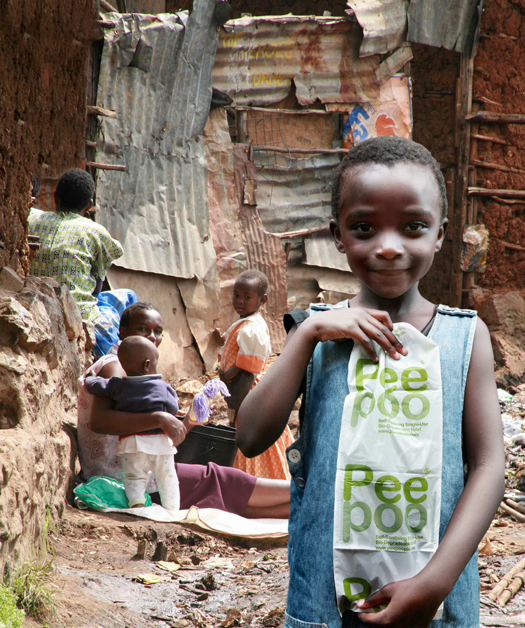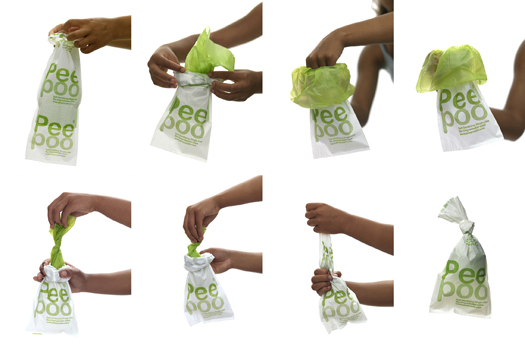
The promotional blurb for Peepoobag, a new self-sanitizing, single-use, biodegradable container for human waste, is as dramatic as it is straightforward: “2.6 billion people just got their own toilet,” declares the website of Peepoople, a private Swedish company that developed the toilet-in-a-bag for the urban poor in developing countries. The number refers to how many people on this planet lack access to basic sanitation — not just a toilet but even a simple latrine. This deficiency leads to water contamination from feces, which contain viruses, bacteria, worms and parasites. One child in the world perishes every 15 seconds due to tainted water. Poor sanitation, says Camilla Wirseen, product manager for Peepoople, “is a silent emergency. People are dying.”
The Peepoobag was designed to provide a solution to the immediate need of relieving oneself; it’s also part of a longer-term, environmentally friendly value chain. Because most toilets are part of a sanitation infrastructure that requires water and huge financial investment, providing a quick, easy, safe and inexpensive way to go to the bathroom is a major advance over using the street. But the advantages don’t stop there. The narrow bag is made of high-performance bioplastic with a thin interior layer of gauze treated with urea, a non-hazardous chemical fertilizer that breaks down feces and urine into ammonia and carbonate. Within two to four weeks, the treated human waste can be used as fertilizer.

The idea for Peepoobag came from Anders Wilhelmson, a Swedish architect and architecture professor. Traveling around the world to study urban development, he frequently encountered the sanitation problem. At one point, he realized it could be addressed with existing ammonia-sanitation technology and by using a bag, which removes waste from the vicinity of people who can’t flush. Portable bags, Wilhelmson reasoned, would be particularly beneficial for women, who in many countries lack even the option of relieving themselves openly, although the practice is condoned for men. The Peepoo bag weighs less than 10 grams so is easily transported for use in any secluded environment. It is odor-free for at least 24 hours after use, allowing it to be stored in the immediate location before it's disposed.
Now that field-testing in Nairobi has proven the bag to be popular, the for-profit Peepoople company is seeking further investment to develop a production unit. One issue is the high cost of the bioplastic, which is made only in Sweden and Germany, driving up the price of a single bag to 4 euro cents. (Studies suggest that potential users are willing to pay only 2 euro cents.) Moreover, it’s important to organize the entire waste-disposal process before wider use is possible. “We say it’s a toilet for people but it’s also a system when it becomes fertilizer and is disposed of,” Wirseen explains, “and that chain has to be in place.”
The rather inelegant name, however, is likely to stay the same in whatever country the Peepoobag is used. “The name reflects the fact that we are all the same — we all do it,” Wirseen says, “whether we are rich or poor.”


Comments [35]
09.18.09
12:37
Cost effective? Yes. But does it really solve the problem? I doubt it.
If people are dying because of a lack of water/plumbing infrastructure than funding and implementation of such an infrastructure would be THE SOLUTION. Otherwise, throwing plastic bags at the poor people and touting it as innovative is just shameful.
09.18.09
01:14
Poor? Just poop in the bag.
Nothing says, Hey, you're just a dog better.
09.18.09
01:43
09.18.09
02:03
When does aesthetic overcome ethical purpose?
I recognize that there are many issues at hand that are easily visible in struggling countries. I also believe that there needs to be sustainable, long-term solutions not just objects of beauty that create a commercial and social applause.
It feels as if some organizations just want a thumbs up from onlooking business and world markets to extend their own marketing strategies. Peepoople is a for profit organization and unfortunately that means that they are still trying to gain profit for themselves (regardless of their intentions).
I do not wish to discredit their efforts but rather propose a better way of approaching solutions. Solutions that last and leave the change in the hands of the countries that live in the struggle rather than upper to middle class foreigners trying to give formulaic results to problems that we merely glimpse. Lets find ways to invest money in third world government programs that can't market themselves. Why don't we give them the means to create change instead of taking the credit ourselves and elevating our current high-status egos?
Peepoo may be a great transition but as for long-term change it can not occur in mere bags, it has to have grander vision accomplished by those who do change, not just hear or see it. Infrastructure change comes from change in the hearts of people not in objects. If change isn't based off of the heart of the people then the aesthetic solutions of change are only an addition to the dark problems the world faces.
09.18.09
02:22
And, yes, I strongly agree that it is unfortunate that we should have to hand impoverished peoples plastic bags to dispose of their bodily
waste. In a perfect world everyone would have the right to basic sanitation, appropriate shelter and food on the table. But until we become that perfect world the PeePoo bag is a step closer to better quality of life for them.
Kudos to Anders Wilhelmson for being so insightful.
09.18.09
02:27
While the creators recognize that sanitation is intimately related to clean water, the fatuously named PEEPOOBAG addresses only one issue and acts as a band-aid, if that.
Ernest Beck writes that the PEEPOOBAG "would be particularly beneficial for women, who in many countries lack even the option of relieving themselves openly." While privacy is important, it hardly seems like the primary concern for women in many places who, according to water.org, are disproportionately responsible for collecting water (often from distant, polluted sources) and for 60-80% of food production. When women don't have to worry about where their water is coming from or whether their children are sick from water-related diseases, they are able to pursue entrepreneurial activities in their communities.
Organizations that take an integrated approach to bringing safe water to poor people are more effective than one that only addresses one part of the problem. It would serve Anders Wilhemson well to take a look at the amazing groups out there that give communities access to, ownership of, and the tools to repair wells, latrines, and teach hygiene education, while working with local, innovative non-profits.
We will benefit greatly if design can teach, empower, and delight, rather than do whatever this dazzle ship is.
09.18.09
03:27
09.18.09
03:43
These under privileged people aren't living in anything close to civilized conditions. They need long term, dignified solutions more than they need pretentious typography on the side of a branded product that is clearly meant to advertise itself and generate money while masquerading as some sort of human rights solution. Not to mention the irony of trying to solve a hygiene problem by creating portable septic tanks that will most probably become the newest form of litter to decorate the local landscape. A bit of common sense please.
These kinds of projects make the design community look bad. It says that we are incapable of relating to anyone or anything that can't afford a morning latte and $300 smart phone. It says that we solve problems with self serving aesthetics and are more interested in getting press than actually helping people.
09.18.09
04:45
So assuming that these could ever be made cost effective, how does one handle the logistics of distribution? Are there going to be UN trucks and helicopters transporting palettes of these bags into rural Africa and the jungles of Southeast Asia, and replenishing the supply every six months? What happens to people who have got used to depending on the bags when the supply runs out?
Peepoo bags are a good idea, but education and infrastructure development still seem like a more practical use of resources.
09.18.09
04:56
that said, a marketing campaign geared towards third-world countries is completely unethical and if you expect people to pay for these bags in place of food and water....?
09.18.09
10:59
09.19.09
03:14
Toilets aren't even the best posture for the deed.
09.19.09
04:20
I wonder about the ramifications of using these bags for other things, to collect and store water or food? People get creative when they are poor and hungry.
And what will a family of 6 or twelve would do with all those bags? The article mentions disposal? It seems that any of our ideas depend on some kind of infastructure.
Still it would be an incremental improvement.
09.19.09
01:10
09.19.09
01:40
As for other long-term methods to solving the problems faced I propose research into other methods. If you have some time here is one organization that is doing just that:
http://www.bloodwatermission.com/indexbd90.html?em1204=43910
09.19.09
02:15
In this excerpt he is talking about the wind-up Freeplay radio, but the observation applies to this product as well:
"But the enthusiasts of the windup radio suffer not from poverty or lack of information but from wealth, vague guilt, and too much information. They are the only people who can find nobility in a product that communicates to its intended owner: you are fucked."
09.20.09
10:05
I also find the "workflow" after the bag is filled to be mostly unexplained. Are these filled bags going to be carried by the "filler" to some common point where they would be left? Would they be just dropped in the street where they would be crushed, run over, and cut open? Is anyone going to be willing to carry their own bag of warm remnants for some unknown time period until it can be disposed? How does the bag end up on a field for fertilizer? Do the field workers show up at some distribution point and carry hundreds of someone else's crap bags out into the field?
The problem is vast and mostly intractable. Some credit is due, at least someone is trying to make it better, but there is a long ways to go here.
09.20.09
03:52
There’s not much point in a long term not-for-profit sanitation project like this. Cholera epidemics kill lots of people very quickly. One can’t ethically make basic sanitation dependent on foreign aid because as soon as the cause celebre changes people who became reliant on Peepoobags DIE. And just handing them out eliminates any incentive to create a sustainable sanitation system not dependent on foreign aid.
If designers really want to concern themselves with sustainability, they’re going to have to develop business models that can sustain themselves. Business infrastructures are far more sustainable than handouts from foreigners who will inevitably move on to the latest popular cancer or immunodeficiancy.
09.21.09
12:20
09.21.09
04:34
09.21.09
05:23
09.21.09
08:55
09.21.09
09:37
for example (as featured in the new york times and national geographic):
http://oursoil.org/about.php
09.21.09
10:39
Do you think if we make the grievous error of letting people defecate in bags for free (!), any incentive to develop waste management and sanitation systems will disappear? That's like saying: "I know if I could defecate in a bag and not worry about funding it, I would lose the incentive to enact political and structural changes necessary to produce a large-scale waste management system." It's not like people who live in dirty water don't have sufficient incentives to change things. They already have the incentive, what they lack is the political capital necessary to effect that reform. I think it has little to do with finding a 'sustainable business model'. The first world has sanitation systems because of public health measures dependent on strong democratic states, not because American Standard came up with a decent business model.
In other words, I certainly hope the peepoobag (ugh) helps people, but there's something a bit too optimistic about it all.
09.21.09
11:32
At the end of the article I chided myself for being too western-narrow-minded: "Perhaps this really could help some folks take a step forward."
After reading the comments, I flipped again: "Nope, this is not a solution. The problem of what to do with waste has to be part of a cycle that is natural and home grown."
Frontier living must have been hard, but here we are. Of course, even we didn't really solve the *whole* problem.
Then I thought "people have been taking dumps for millenia, what's changed? Why is this so intractable? Is it the sheer number of us? Is it really pure pedagogy?
This reminds me of the case against genetically modified crops sold to developing nations. The reality on the ground could well be "@#$% the genepool, give me a bowl of rice so I can work and live another day!"
09.21.09
11:54
but seriously.. this only makes sense in heavily dense areas that have no proper sanitation or waste system.
I lived in the country side back home and always just dug a hole at our farm.. but not everyone have that so this makes sense.
BUT. what if they don't have a garden? no space to dispose of the bags? no one to pick them up to dispose of them? would the bags cause a new problem to face?
Nonetheless it helps in SPECIFIC places... and not just Africa
; )
09.22.09
03:28
09.24.09
04:34
09.25.09
06:22
-Alexa
I would agree that someone should front the cost of the bags if they are to be implemented. For people in the conditions that they are looking to distribute the bags they may be better off putting their saved money towards temporary life sustaining items such as food. How much money can they afford to take care of their own feces when they are strapped to find sustenance?
The one question I do have in regards to the quote above is whether or not it is completely the government's fault in those countries. It is true that they have not aided the cause in any way shape or form and in some instances have actually dismantled infrastructure but I don't know if its complete grounds for stating they should front all the cost of the bags. If the PeePoo organization is wanting to help maybe they should front the cost rather than seeking profit. Our world crumbles not because of the existing wrongs but from the created evils that come as a result of "good" people unwilling to do anything that does not create gain for themselves.
"The greatest impediment to an ecological design revolution is not, however, technological or scientific, but rather human."
-David Orr, The Nature of Design
One last thought to ponder...even if it was totally those government's faults, do you believe that they will want to front the money after all that they have taken; all they have destroyed?
10.07.09
04:10
10.07.09
04:31
I dont' think that the dream of a toilet hooked up to a proper sewage system for every household is going happen anytime soon.
09.05.10
07:01
09.06.10
02:51
09.21.10
10:26
06.08.12
02:42